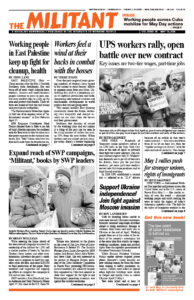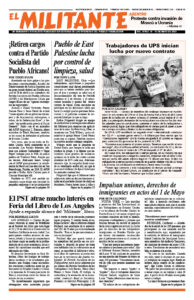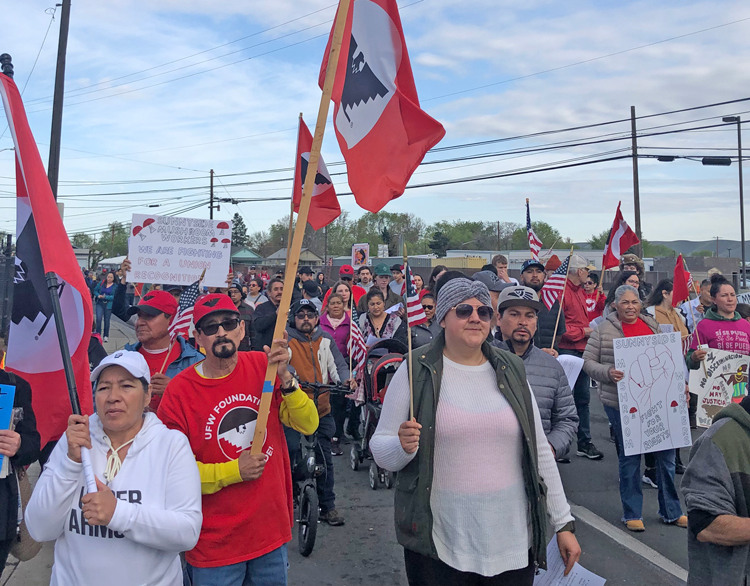NEW YORK — International Workers Day marches and protests across the United States and in the U.S. colony of Puerto Rico May 1 — like similar actions all over the world — attracted working people and youth looking for ways to resist the impact of today’s deepening capitalist crisis. The fight for the rights of immigrant workers in the U.S. who don’t have government-recognized papers was at the center of many of the actions.
“I came today because we need better wages and pensions for everybody,” Antonio Paulino, a member of Laborers’ International Union Local 79 here, told the Militant at a May Day march of about 350. “We need a standard of living to be able to maintain a family.”
“It doesn’t matter whether we are ‘legal’ or ‘illegal,’” said domestic worker Vincent Samuel, originally from St. Lucia. “We all should have the same rights.
“The salary for domestic workers is just not enough,” she said. They often get just a few dollars more than minimum wage, especially newer workers.
“When you’re sick, they still want you to come to work,” added Maggie Matthieu. “And if you don’t come in you don’t get paid.”
‘We need union control over our conditions and jobs’
RIVERSIDE, Calif. — About half of the 200 people who joined a spirited march and rally here, organized by the Inland Coalition for Immigrant Justice, were members of the Teamsters, United Steelworkers, Service Employees International Union, United Auto Workers and other unions. High school students also joined the action.
“I believe in unions. When I was a kid, I made a decision I would never work anywhere that there wasn’t some control over the conditions,” Carlos García told the Militant. “My father was pressured by a boss to cut corners on a job and fell 16 feet. From 40 on he was never able to work again. Safety is a number one issue for workers.
“The only way we have strength is in numbers. There are other issues like pay, most people are working a second job,” he said.
— Norton Sandler
‘We have to organize or we’ll be driven to our graves’
WASHINGTON, D.C. — Over 50 people, mostly truckers from 17 states, protested outside the U.S. Department of Transportation here May 1, organized by the Truckers Movement for Justice. The group seeks to unite all drivers, whether paid by the hour, lease drivers or owner-operators. They carried signs demanding, “All hours paid for all hours worked” and “Paid overtime.”
“All workers, whether you’re a trucker, an agricultural worker or a factory worker should get overtime pay after 40 hours,” Caleb Fernandez, from Hunter, Utah, told the Militant. “Time spent waiting for a load can’t be exempted.”
Another key demand is the right to see the freight bill before they take a job. Owner-operator Mark McMiller from Blaine, Minnesota, said rates from brokers, middlemen between the trucker and shipper, are so substandard that truckers and their families can’t make ends meet.
“It’s take-it or leave-it. We don’t see how much the broker booked the job for, from the shipper,” he said. That makes it hard to negotiate a better price.
With warehouses filled with unsold goods, truckers are being squeezed by what many call a “freight recession.” Ray Randall, a retired owner-operator, said, “There’s an ‘I’ve got to get this load’ mentality. We have to keep organizing or we’re slowly driving toward our own grave.”
— Arlene Rubinstein and Sarah Ullman
Milwaukee march demands rights for immigrant workers
MILWAUKEE — Hundreds marched here in a cold rain May 1 demanding the state government issue driver’s licenses to all, regardless of a person’s immigration status. The action was sponsored by Voces de la Frontera.
Since 2007 drivers who can’t prove they are here legally can’t get a driver’s license in Wisconsin — making it hard for undocumented immigrants to get to work, take kids to school, or much else without risking arrest.
“Everyone should have rights, regardless of their legal status,” foundry worker Gabriel Quintero said, “including the right to live, to work, to affordable housing. I hope the Congress and President Biden will address these questions.”
“Workers need to organize independently of the Democrats and Republicans,” I said. “We need our own party, a labor party based on our unions. I’m a freight rail conductor. Last year we voted to go on strike over intolerable working conditions and job cuts. The one thing the Democrats and Republicans could agree on was to pass a law to prohibit our strike and impose the contract we had rejected.”
“We have to fight,” Quintero replied.
— Naomi Craine
Mushroom workers fight to defend their union
YAKIMA, Wash. — Mushroom pickers led the lively May Day celebration and march here of 150. They came from nearby Sunnyside where they’re fighting for recognition of the United Farm Workers.
Canadian-owned Windmill Farm Mushrooms bought the farm from Ostrom — where workers voted to join the union last June — and then told all the workers they had to reapply to continue working there, without a union.
“They accuse people of not picking enough” as a pretext to fire them, said Isela Cabrera, who has worked there for two-and-a-half years. “We are demanding the company sit down with the committee and negotiate a contract. We also want them to rehire workers they fired.”
— Rebecca Williamson
Puerto Ricans march for wages, pensions, against colonial rule
More than 1,000 people marched in San Juan for May Day. The lead banner said, “Out with the junta,” referring to the U.S-imposed Financial Oversight and Management Board, which has veto power over every financial decision of the government of Puerto Rico, a U.S. colony. The junta and the colonial government have been imposing deep cuts in pensions and pushing through the privatization of the island’s energy system to maximize payments to wealthy bondholders.
The march was sponsored by trade unions, community and environmental organizations, and groups and parties that oppose U.S. colonial rule, including the Cuba Solidarity Committee.
“We deserve a dignified retirement,” Liza Fournier, president of the Únete teachers union, told the crowd.
“The federal minimum wage is impoverishing our working class,” said José Adrián López, president of the Central General de Trabajadores union federation. “We call on working people to organize through the unions to defeat poverty in this country.”
— Seth Galinsky


